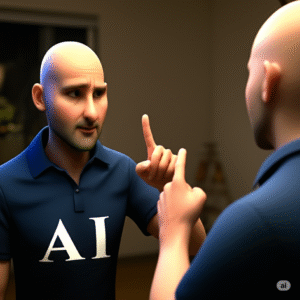
Never fear, AI is here! Perhaps you find yourself agreeing with that adage, or you might be on the other side, peering around every corner, fearing where AI might be lurking. Before I go too far, I wanted to share some perspectives. Sometimes I fall into the abyss of the CBC…two interesting perspectives on AI: Kids and from the teachers and professional bodies.

AI will revolutionize the education of our classrooms, but will that revolution be for the better? I believe AI has the opportunity to have a positive impact on today’s classrooms. The possibility of personalized learning with AI should have a positive impact on academic performance and overall student engagement. The big question that comes to my mind is: What age should our students first start actively engaging with AI and their LLMs? One source suggested ages 9 and 10, but there still seems to be uncertainty.
Perhaps the uncertainty stems from critical thinking skills. One source notes that critical thinking exists in children as young as 3, preschool age. The authors highlight the importance of social experience in the development of critical thinking skills. Playing with AI LLMs like ChatGPT or Gemini might allow our students to strengthen their critical thinking skills. However, are we just strengthening the AI, as LLMs are constantly learning from human inputs?

Like many questionable things in society, we have rules and policies around their usage. AI should be no different. Who makes the policy? Does the Google Gemini team, the school administrator, or the parent advisory group? How many stakeholders should be sitting at the table, and which stakeholders perhaps should be left out? This US government report makes some suggestions, but I also wonder about teacher usage.
When reading about teachers and their experiences with AI, you will often hear stories about academic integrity and plagiarism. I would agree that students need to be putting in the work and not developing poor habits or even apathy. Something I always wonder is, how do teachers share how they use AI with their students?
A large benefit of using AI is the time savings. I myself have dabbled with AI to craft lesson plans or even comments. Time is seemingly always fleeting as a teacher. However, how often do teachers disclose their usage to their students or families if they used AI to craft comments on a report card? The point I am trying to navigate towards is responsible usage. Students need to be taught how to use AI and how to navigate the world with AI. Teachers need to be open and share how and when they are using AI, and act as role models for their students.

Hi Dustin,
Appreciate your thoughts here! I agree that AI could have a positive impact in our classrooms and find your question of age interesting. In both the second debate (social media) and the fourth debate (cell phone bans), we talked a lot about ‘appropriate’ ages, but it didn’t come up in regards to AI use. Interesting. I wonder why? Do we all just assume AI usage begins naturally with older learners who have access to laptops? Or were we just wrapped up in all the complexities of AI use and education, that a grade/age restriction didn’t come to mind? Hmm.
I like your point about modelling proper AI usage and disclosing this usage to all parties involved. I suppose that goes with your clever title. If teachers expect students to disclose their AI usage, then of course they should be modelling that. This would also help dismantle any potential ‘taboo’ around AI usage, showing students that responsible usage is welcome, but that honesty goes along with that.
I also appreciated your point on critical thinking brought up in the debate. While many argue AI diminishes students’ ability to think critically, I thought your point that perhaps it challenges thinking more critically than ever interesting. Topics like AI (being so new with many unknowns) come with a lot of fear and negativity, so I appreciate hearing a positive or optimistic spin on it.
Thanks!
Teagan
Thanks for your comments Teagan. I think it can be easy to bring the ‘doom & gloom’ all the time but it doesn’t really do much to address issues. I have to try to be more positive for my own mental health, but I am guilty of the negative at times.
Hi Dustin,
Thanks for such a thoughtful and engaging post, your title immediately pulled me in! I really appreciated the way you highlighted the tension between embracing AI and still maintaining our authenticity as educators. That line you wrote about being “aware, but not afraid” really stood out to me. I think that’s such an important mindset for navigating this rapidly changing tech landscape.
In my own blog post, I reflected on that same push and pull, wanting to stay current and make use of the amazing tools AI offers, while also making sure we’re not losing sight of the human connection and critical thinking we’re trying to foster in our students. I loved how you touched on the idea of transparency, not just in our use of AI, but also in modeling it for our students. I think the more we openly talk about how and why we’re using these tools, the better we can help students build healthy, informed relationships with AI as well.
Thanks for sharing!
Thanks for the feedback Kaela. I agree that an open dialogue is important to having healthy relationships with our students and with the AI.
Hey Dustin,
I appreciate your thought-provoking and engaging post. You did a good job balancing curiosity and critical reflection. I liked how you highlighted both the potential and uncertainties of AI in education. Your question about when children should begin using AI is particularly relevant. I strongly believe early dependence stifles creativity, foundational skill set, and critical thinking.
Your mention of social interaction as key to thinking development is aligned with Vygotsky’s theory of social constructivism, an angle worth diving deeper into. You have raised powerful questions around policymaking, too. Who really should be sitting at the AI table? The inclusion of parents, educators, students, and developers seems essential, but how can we prevent decisions from becoming too tech-corporate driven?
Your use of multimedia made the post lively and memorable-good read!
~Sadi
Thanks for the comment Sadi. I would share in your fears of the power that corporate tech can wield over are lives. It is important to teach students to think and let them problem solve on their own before giving them access to a powerful tool like AI. I can see students asking the questions, why do we have to do this when AI can?
Hey Dustin,
I really enjoyed your post. That line “Do as I say, not as AI do” was such a fun way to start. It made me laugh but also made me think about how we are all still figuring this AI thing out.
AI definitely has its perks. It can personalize learning, give quick feedback, and even support students who need extra help. But let’s be honest. How many students are actually using it to understand things better, and how many are just typing in their homework and copying the response? And really, can we blame them? If they are not given clear instructions or proper guidance, who would not be tempted to take the easy way out?
Even as teachers ourselves, we are in the same boat. If no one shows us how to use AI responsibly, and we are juggling a million things, are we not going to let AI write a few comments for report cards? Probably yes.
The problem is not AI itself. It is how we are teaching people to use it. Maybe instead of fearing it, we should focus more on teaching smart and ethical use.
-Sarada
I agree Sarada. Fear, a vital survival tool, won’t move our society along. It is time to consciously embrace AI, find active and engaged means to utilize it as a tool for strengthening education.